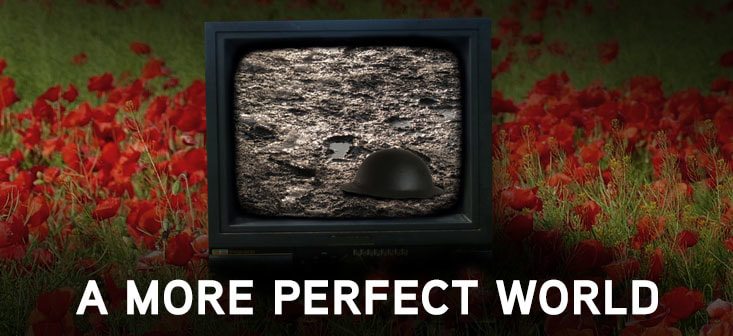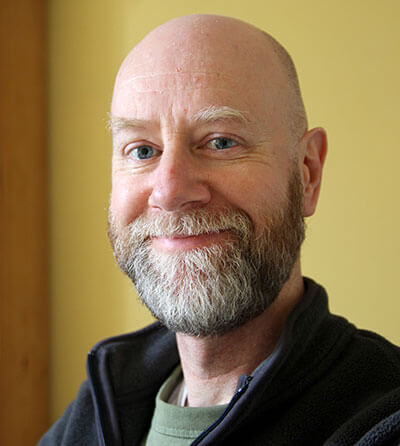|
A MORE PERFECT WORLD by Tony Green
Abingdon Drama Club The Unicorn Theatre, Medieval Abbey Buildings, Checker Walk, Abingdon, OX14 3JB 11-14 April 2018 Tony Green's thoughtful and engaging new work A More Perfect World, about the experiences of those who participated in the First World War, had about it the flavour of what academic historians call the historical method. This is the standing back from events, the careful sifting of evidence on both, or all, sides of an argument, and the drawing of a conclusion that tries to avoid the hyperbole of 'all-or-nothing' thinking. So the revelation in the programme notes that Tony had read for an MA on the First World War came as one of those 'ah, yes, of course' moments. Don't get me wrong, this play was far from a dusty academic treatise. It was an evening's entertainment that I'm pleased I took the trouble to see. It was an attempt to construct a story of three people's experience of the Great War that avoided cliché and the myths that have clung like barnacles to the popular 'memory' of that conflict. It was also a piece that wanted to entertain us, using empathy and humour to make its points. Complex structures that fascinated and impressed were the order of the evening, both in the three-plays-in-one arrangement of the story and the set design that rivalled the ingeniousness of an Elizabethan priest-hole builder, more of which below. Our three main characters are Wil [sic] Fowler, who served as a private soldier in the trenches, Colonel Rennett-Chalmers, who joined the General Staff during the war, and Samantha ('Sam') Talbot, a member of the Voluntary Aid Detachment (VAD), who were auxiliary nurses and carers. We see them over two time periods: during various episodes of the First World War, and in 1978 as they are about to record their memories of the war for a television programme commemorating the 60th anniversary of the conflict. But the play opens in the present day (2018) with a history professor (played by Colette Lardner-Browne) also preparing to speak in a television interview to mark the centenary of the war's end. Over the course of the war, Wil (Harry Rowe), Rennett-Chalmers (Tom Atkinson-Seed) and Sam (Charlotte Griffiths) lose their innocence, but not their decency, as, respectively, the brutality of the trenches, the high casualty rates and the suffering in the hospital wards affect each of them. The young Rennett-Chalmers starts to question the strategy that is costing so many men's lives for so few yards of territory. But it is a court-martial on which he sits that affects him most deeply and enduringly. The older Rennett-Chalmers (Jon Crowley) is still pained by the sentence of execution for desertion that he and his fellow officers handed out. By contrast, the older Wil Fowler (Keith Hales) has survived emotionally much better from the experience, ironically so, as he saw more frontline action than the other two. The older Sam (Geraldine Hobson) likewise presents a more emotionally grounded figure. For both Wil and Sam, the war appears to have had the unintended consequence of personal growth and rounding of their characters. There is a tension through the play between popular conceptions of the the war, moulded by establishment and media political agendas, and the evidence of the participants' experience of actually fighting the war, and it is this (to me, at least) fascinating conflict of ideas that forms the spine of the play. We see it in the conversation between Private Wil Fowler and Corporal Bramley (Kieran Piggott) about the former's attempts to write poetry about the war. Bramley opines that it would make more sense to write verse about women because that is certainly what occupies his mind all the time. It is also a challenge to the notion that the War Poets such as Owen and Sassoon are the only authentic voice of the fighting man. We also see this tension between myth and reality in the picture painted of the officer class. This was one of the most noteworthy and brave aspects of the play. To challenge the 'lions led by donkeys' trope that dominates depictions of the conflict is to challenge the 'authorised version' of the First World War. Such narratives are underpinned by ideological views about class and war itself that are, in 2018, seen as de rigeur in polite company. The older Rennett-Chalmers' revelation that over 200 generals were killed or wounded in the war (it's true, I checked), and that, as a member of the General Staff, he tried to visit the battlefront as frequently as possible, as did other senior officers, drops a bomb (no pun intended) on that particular myth. It reinforced the view of the history professor in the opening scene (set in 2018) that Field Marshal Haig was not the mythical monster who sent thousands to their deaths with never a second thought. Interesting too was the argument young Rennett-Chalmers has with his C.O., Colonel Mead (Dave Cassar), over the Battle of Verdun. Mead is allowed to put forward a strategic justification for the British involvement, and large casualties, in aiding the French that is not mocked or sneered at, or of which the audience is invited to disapprove. This is a view of history without the pantomime heroes and villains. It is the final speeches of the three principal characters in 1978 that pack the most punch however. Rennett-Chalmers, we learn, not only felt guilty about avoiding most of the danger as a staff officer, and preserving his life where others lost theirs. He subsequently lost his own son, who was killed as an airman in the Second World War. An ironic twist of the knife which he has borne with quiet dignity all this time. Wil Fowler, a normally jolly character, becomes angry about how the myth-makers have started to rewrite history and present a different version of events from the one he lived through. Another theme surfaces again – the notion that the views and testimonies of ordinary men and women who served in and experienced the First World War can be discounted as ill-informed, uneducated, even stupid. Sam Talbot addresses the position of women during and after the war, but again challenges the myth-makers. Yes, she says, women had the opportunity to do things they had not had before. Yes, their self-confidence grew. But, she says, she won't be giving a speech about liberation and emancipation. What actually happened was that women rejoined their men (those who had survived) and just 'got on with life'. The final scene is back in the present day with the history professor. She chats with the production assistant (Lissy Coppock) about the desire of the popular media to make 'sexy' history. As if to prove the point, after the professor's departure, the assistant is told by the voice of her unseen director (Lin Crowley) that the film footage of Rennett-Chalmers' 1978 interview will probably not be used because it doesn't fit the narrative (of WWI officers as 'pompous conservative figures'). This was a production blessed with a strong cast. The actors playing Wil, Rennett-Chalmers and Sam in both their young and old incarnations (named above) turned in assured performances. There were also strong showings from Kieran Piggott as an avuncular Corporal Bramley, Lucy Wilton as Sam's jolly fellow VAD Elizabeth Copperington-Cook and Dave Cassar as Colonel Mead. There were one or two first-night wobbles with lines in a couple of the longer speeches, but the actors concerned covered effectively and carried on. This was generally a confident effort all round. Michael Ward deserves praise for his set design. This was an arrangement with hinged walls that brought us the trenches, a hospital ward and a television green room all with a few pushes and pulls by members of the cast. There was also the gauze-walled 'crying room' (my name for it, not his) where nurses would retreat after having a soldier die in their care, used to great effect in one scene with the young Sam. There were the obligatory shell blasts and machine gun fire effects, of course, but this was not a play that was about blood, gore and slaughter; it was, as Tony Green wrote in the programme notes, an attempt to create characters who were people not simply victims. Director Maria Crocker deserves credit for bringing to the stage a piece that tackles some difficult themes and a view of the Great War that seeks to humanise all its participants.
0 Comments
Leave a Reply. |
About the Author
Mike Lord has been involved with amateur theatre for over twenty years, mainly as an actor but also, more recently, as a director. Archives
July 2019
Contact me
Please use the Contact Form for anything apart from comments on blog posts. |


 RSS Feed
RSS Feed
